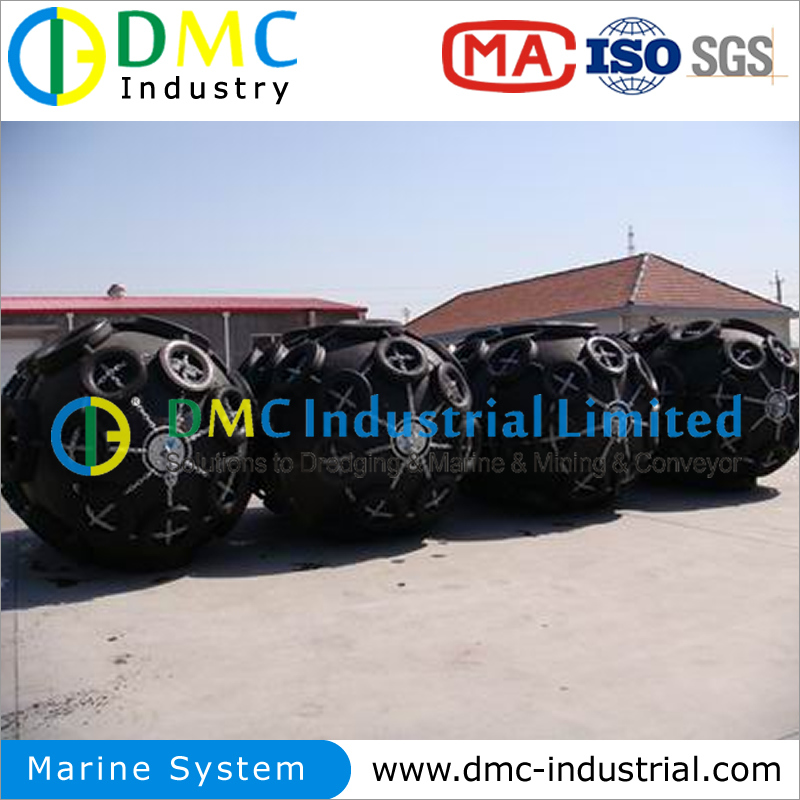Â
Floating Pneumatic Rubber Fenders which is made of synthetic-cord-reinforced rubber sheet with compressed air inside to enable it to float on the water and work as a shock absorber between two ships (ship-to-ship), or between ships and berthing structures when they come alongside each other on the water.
Â
Advantages of Floating Pneumatic Rubber Fenders
Â
Floating pneumatic rubber fenders can be easily handled and installed with guy-rope or guy-chain because of its light weight. It can resist the shearing force and maintain energy absorption level under inclined compression up to 15ºC. Meanwhile, provide the low and
comparatively even hull pressure.Â
Consisted of several synthetic-cord layers and tough abrasion resistant out rubber, they have consistent performance even under rough condition and cyclic load. The maintenance cost and damage risk are minimised too. The best material also ensure the self-buoyancy and extremely long service life.
Â
Floating Pneumatic Rubber Fenders Requirements
Construction features
Floating pneumatic rubber fenders shall consist of an out rubber, reinforcement synthetic-tyre-cord layer, and inner rubber, vulcanized firmly.
The out rubber are used to protect the cord layers and inner rubber from abrasion and other external forces. This rubber compound have sufficient tensile and tear resistance strength to withstand anticipated weather conditions and severe usage.
The reinforcement synthetic-tyre-cord layer strong enough to maintain the internal air pressure of the fender
The inner rubber layer seals the pressurized air inside the fender
Fenders of diameter 2500mm and larger equipped with safety valve for releasing excess internal pressure when the fenders are over-compressed accidentally.

Â
Â
Pressure requirements of floating pneumatic rubber fender
We make floating pneumatic rubber fenders with 50kPa (pneumatic 50) and 80kPa (pneumatic 80) initial pressure. The internal pressure, endurable pressure, safety-valve setting pressure and hydraulic test pressure are also in compliance with the requirements of ISO 17357:2002.
Â
Floating Pneumatic Rubber Fender Performance
The performance of floating pneumatic rubber fenders shall be specified in terms of Guaranteed Energy Absorption (GEA), Reaction Force at GEA deflection, and Hull Pressure at GEA deflection.
Marine Boat Fender for Medium and Small Vessels
| Vessel Tonnage | Size (D*L) mm | Recommend Vessel |
| 50 | 500*1000 | Fishing Vessel |
| 100 | 700*1500~1000*1500 | Fishing Vessel |
| 200 | 1000*1500~1200*2000 | Fishing Vessel, Tugboat |
| 300-500 | 1200*2000~1500*2500 | Fishing Vessel, Tugboat |
| 1000 | 1500*2500~1500*3000 | Tugboat, Transport Ship |
| 3000 | 2000*3000~2000*3500 | Ocean Trawler, Transport Ship |
| 10000 | 2000*3500~2500*4000 | Transport Ship |
We just share our stock in warehouse, we could list a rich portfolio which may help you get replacement parts easily.
Flanges are used to connect valves, pipes, pumps and other equipment to make a pipework system. Typically flanges are welded or threaded, and two flanges are connected together by bolting them with gaskets to provide a seal that provides easy access to the piping system
Stainless Steel Flange,Forged Steel Flange,Valve Flange,Pipeline Flange
Zhejiang Philic Fluid Control Co.,LTD , https://www.philicflow.com